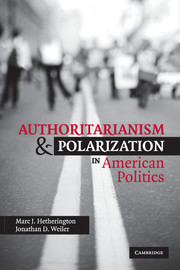Book contents
- Frontmatter
- Contents
- Acknowledgments
- 1 Spanking or Time Out: A Clash of Worldviews?
- 2 Putting Polarization in Perspective
- 3 Authoritarianism and Nonauthoritarianism: Concepts and Measures
- 4 A Historical Account of the Roots of Worldview Evolution
- 5 Authoritarianism's Structuring of Contemporary Issues
- 6 Threat and Authoritarianism: Polarization or Convergence
- 7 Evidence of Worldview Evolution
- 8 Immigration: A Reinforcing Cleavage that Now Constrains the Republican Party (GOP)
- 9 What the 2008 Democratic Nomination Struggle Reveals about Party Polarization
- 10 A New View of Polarization
- Epilogue
- Bibliography
- Index
1 - Spanking or Time Out: A Clash of Worldviews?
Published online by Cambridge University Press: 05 June 2012
- Frontmatter
- Contents
- Acknowledgments
- 1 Spanking or Time Out: A Clash of Worldviews?
- 2 Putting Polarization in Perspective
- 3 Authoritarianism and Nonauthoritarianism: Concepts and Measures
- 4 A Historical Account of the Roots of Worldview Evolution
- 5 Authoritarianism's Structuring of Contemporary Issues
- 6 Threat and Authoritarianism: Polarization or Convergence
- 7 Evidence of Worldview Evolution
- 8 Immigration: A Reinforcing Cleavage that Now Constrains the Republican Party (GOP)
- 9 What the 2008 Democratic Nomination Struggle Reveals about Party Polarization
- 10 A New View of Polarization
- Epilogue
- Bibliography
- Index
Summary
In September 2004, National Public Radio's late afternoon news show, All Things Considered, visited West Virginia to interview potential voters. The state had gone to George W. Bush in 2000, marking a departure from its typical voting pattern. Between 1932 and 1996, Republicans won West Virginia only three times (1956, 1972, and 1984), and each victory was part of an over whelming Republican landslide. Even in 1980, when Democrat Jimmy Carter carried a mere six states, one of them was West Virginia. Democrats have dominated the state's congressional delegation for decades. In 2000, both U.S. Senators, Robert Byrd and Jay Rockefeller were Democrats, and two of the state's three congressional districts were represented by longtime Democratic incumbents. Bush's victory, moreover, was substantively important. Had West Virginia voted Democratic as was typical, Al Gore would have been elected president with 271 electoral votes.
One of reporter Brian Naylor's interviews on NPR was with a truck driver named Mark Methany. With the September 11 terrorist attacks only three years in the past, the candidates' relative ability to deal with foreign threats and terrorism was, not surprisingly, on Methany's mind. The way he talked about the issue, however, was a bit surprising. In sizing up the contest between Bush and Democratic Senator John Kerry of Massachusetts, Methany said, “I really think that [George Bush] is the man for the job to face down our enemy. He won't just give [Osama bin Laden] a time out. He'll smack him in the mouth.”
- Type
- Chapter
- Information
- Publisher: Cambridge University PressPrint publication year: 2009



